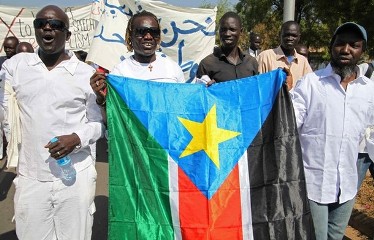30 people killed in fresh attacks in South Sudan’s Jonglei state
March 3, 2012 (BOR) — At least 30 people have been killed and more than 15 injured in fresh clashes between armed groups from the Lou Nuer and Murle ethnic groups in Jonglei state’s Nyirol county since Friday 2 March, according to the county commissioner.

“A huge number of Murle youth attacked on Nyuon cattle camp. They killed about 30 young men, wounded 15 and made away with 15,000 heads of cattle”, Duoth said.
He claimed that South Sudan’s military – the Sudan People’s Liberation Army (SPLA) – in Nyirol were informed about the assault but refused to intervene.
Clashes between the Murle and Luo Nuer occurred on a daily basis between 24 February and 1 March according to the weekly humanitarian report, by the United Nations Office for the Coordination of Humanitarian Affairs in South Sudan.
Duoth said that civilians in Jonglei were preparing to hand over their guns to the government forces as part of a state-wide disarmament programme, which began on Thursday. He said that people expected the SPLA to protect them from such attacks.
The commissioner said the fighting was still going on Saturday evening in the west of Akobo County.
He said his request for trucks to go and collect wounded was turned down by the SPLA forces at his county headquarters. SPLA officers in the area were not available to comment on these allegations on Saturday.
Duoth criticesed his counterpart, commissioner of Pibor, Joshue Konyi Irer, for denying on UN radio that young men from the Murle tribe, which hail from Pibor, where involved in the recent attacks.
DISARMAMENT CAMPAIGN
There are conflicting reports other whether a planned disarmament campaign in Jonglei state began on 1 March as originally planned. The SPLA has deployed large numbers of soldiers to the state, South Sudan’s largest, but have not reached all the remote areas.
This latest attempt to disarm civilians in Jonglei state was brought about after large scale clashes between the Luo Nuer and Murle in December and January, which affected over 120,000 people, the UN say.
Over 6,000 armed Luo Nuer entered Pibor County attacking the Murle and rading cattle. People claiming to represent the disgruntled young men say that it was in response to Murle raids on their territory.
A group called the Nuer White Army said that they intended to disarm the Murle and return women and children who they claim had been kidnapped. The United Nations Mission in South Sudan (UNMISS) and the SPLA responded to the attack by deplying more troops to the region.
UNMISS have said that the disarmament campaign has been postponed until 15 March from the initial date of 1 March. However, Jonglei governor Kuol Manyany, gave conflicting statements on Thursday.
“I have been officially told that disarmament is starting today”, Kuol said on Thursday. But he went on to say: “We are just waiting, it is not yet started”.
In his meeting with the SPLA commanders in charge of division eight in Jonglei, Kuol told the journalist that forces has started moving to Buma in the far east of Pibor and will be fully deployed in the state before the exercise begins.
“I have briefed the chiefs and the commissioners who came here yesterday [Wednesday] to sensitise and inform their people about disarmament so they hand over their guns to SPLA”, he continued.
In a phone call to Pibor, the commissioner, Joshua Konyi Irer said both police and SPLA forces have arrived in the Pibor and are still being deploying to remote areas. This must be completed before the process of collecting the illegal arms begins.
A resident from Akobo County told Sudan Tribune that SPLA troops in his area were armed with “heavy guns”.
Although the disarmament will begin as a voluntary process the military has warned that force will be used if groups refuse to cooperate.
According to the UN humanitarians fear that there may be clashes between the military and local communities further complicating the response to those affecting by the recent violence.
(ST)
